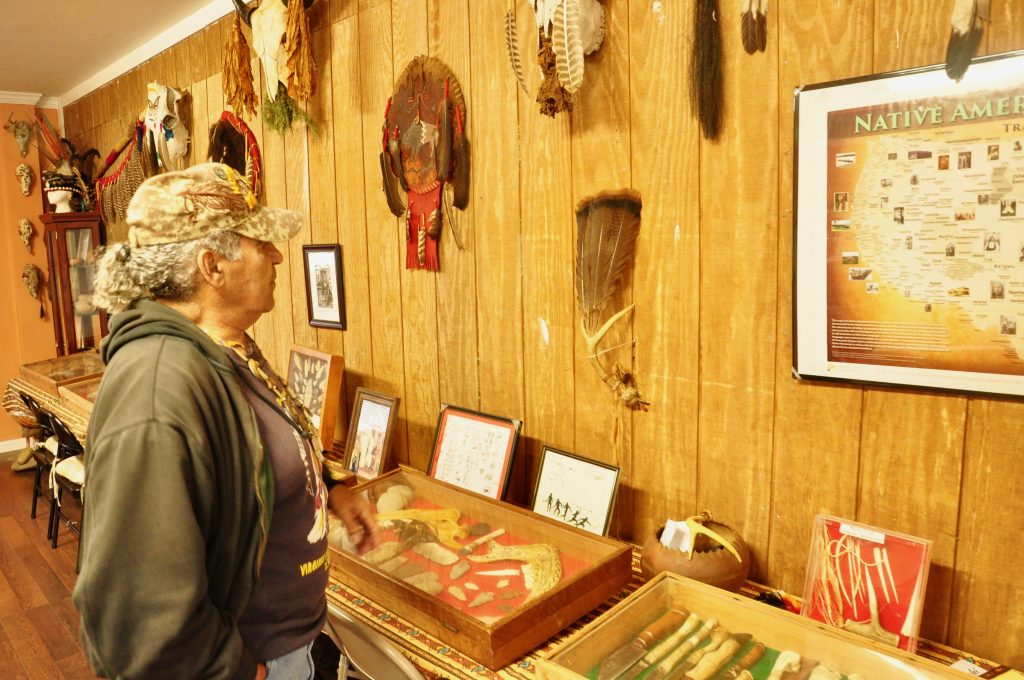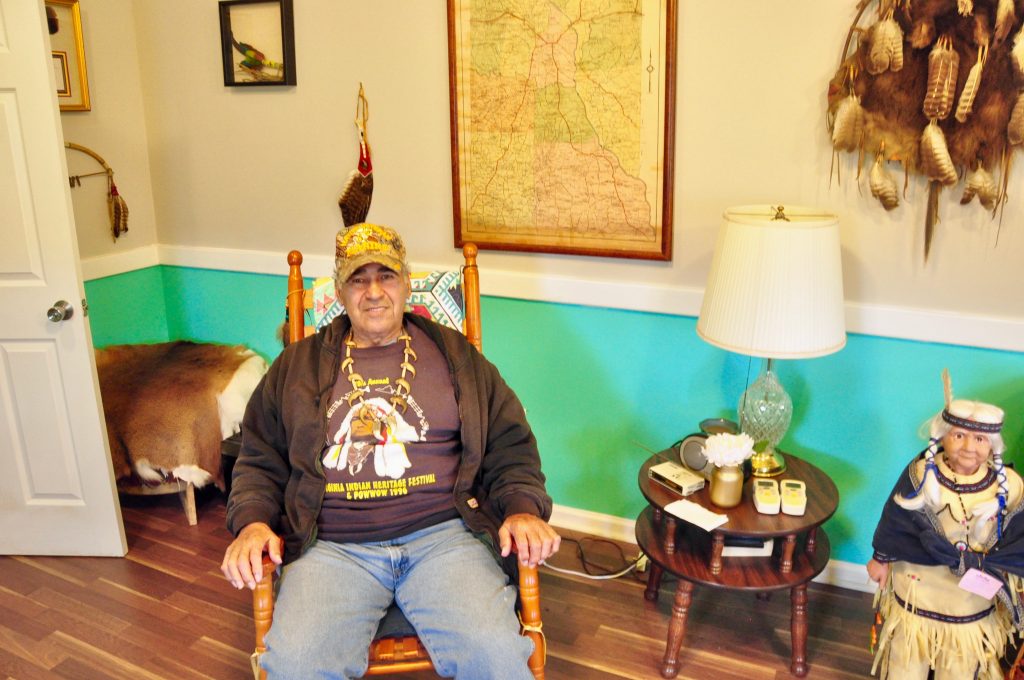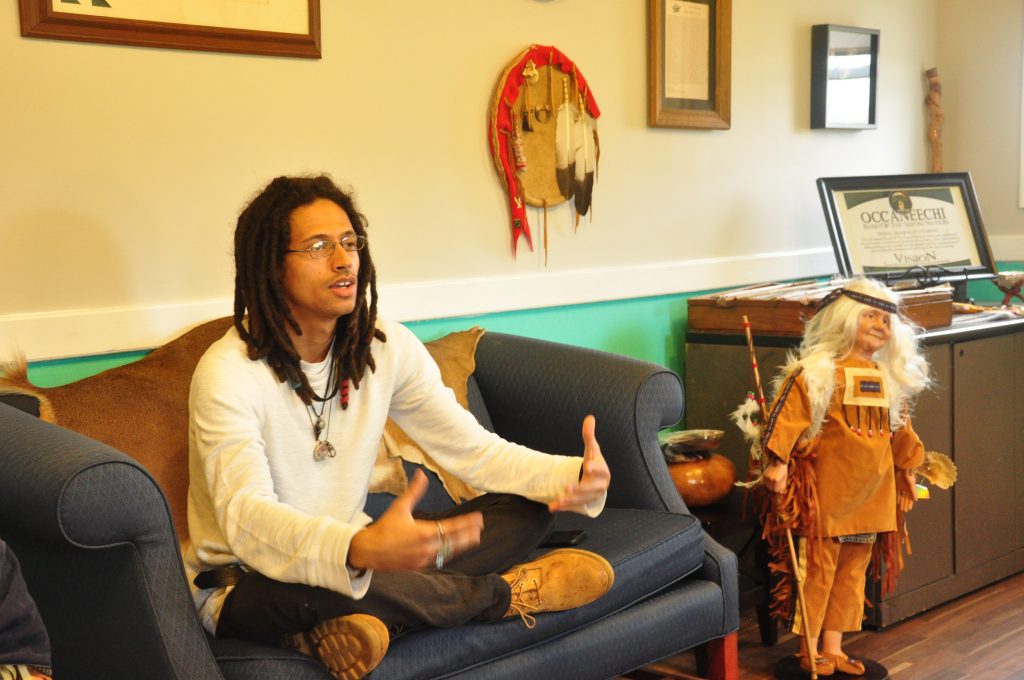The walls of the community center, which double as a museum, are covered in tribal regalia for powwows, bows and arrows, spears and other instruments — all belonging to the Occaneechi Band of the Saponi Nation.
Glass cases house even more traditional tools and regalia, and John “Blackfeather” Jeffries — sporting a T-shirt from the 1996 Virginia Indian Heritage Festival and Powwow — overlooks it all.
Many of the items were made by Jeffries himself, who acts as a kind of spokesperson and advocate for his tribe.
Quick to make a joke or let out a hearty laugh, Jeffries is a popular source for those seeking information about the Occaneechi Band of the Saponi Nation.
Although referred to by some tribal members as chief, Jeffries would call himself a representative of the tribe.
“I tell people, I’m not the chief,” he said. “I’m a spokesperson for the people. I’m not a professional, I’m just a traditional native.”

Jeffries is a member of the Occaneechi Band of the Saponi Nation, a state-recognized tribe with land in Alamance County, N.C.
The Saponi occupied lands in Virginia and the piedmont of North Carolina in pre-colonial times. Since then, colonization and ensuing migration has greatly reduced their numbers in the region.
The Occaneechi Band of the Saponi Nation, reorganized in 1984, has a mission to revitalize its cultural heritage and strengthen its community. A large part of its goals are being realized through the Homeland Preservation Project.
Conceived in 2000, the first step of the project was taken in 2002, when the tribe bought up part of its ancestral lands in Alamance County. More land in the area was acquired in 2004.
Since then, measures have been taken to acquire funding for further expansion. The tribal lands currently contain a permanent ceremonial ground, the beginnings of a historical Occaneechi village, and a community center and museum for events.
“We’re moving forward and we’re all happy with the progress we’ve made so far — every time I see a grant, I jump on it,” Tribal Administrator Vickie Jeffries said.

Encouraging community involvement is another priority for the tribe.
“That’s our purpose, to have people come out,” John Jeffries said.
Vickie Jeffries gave credit to John Jeffries for his role in bringing people out to the ceremonial grounds.
“He’s always spreading the word; he’s always telling people about things happening, going on,” she said.
“Johnny is a wealth of information — everybody loves to talk to him, and they love to see his collection.”
The collection in question is stored in the tribal center, which doubles as a museum.
John Jeffries made note of two ceremonial fans that had been gifted to him by members of another tribe and are now stored in the tribal center.
“That’s how it is for all this stuff. They have a home now,” he said.
The Occaneechis’ vision for the area go even further. Tribal members’ plans include the reconstructed historical village— containing atis, the tribe’s traditional housing unit — and a learning center and gym for children, with the possibility of a summer camp.
Eventually, the Tribe may have a daycare center or community kitchen. For now, however, the focus is on the cultural aspect.
“We really want to start with the culture and history for our youth, and that will be a wonderful thing,” Vickie Jeffries said.

Josh O’Neil is a senior at Elon University who has been involved with the tribe for the past four years. Younger tribal members like O’Neil often find themselves split between their heritage and wider American culture.
“The younger generation, my generation and the generation that’s coming after me, we’re sort of pulled between different cultures,” O’Neil said.
“We’re pulled by the mainstream American culture to be individualist — to make money, to sort of carve our way in America — but our America, our home, is sort of counterintuitive to what America wants us to be.”
O’Neil believes that a camp for youth would be a good way to teach younger members about the Tribe’s culture.
“You can have an immersive environment, where they breath Occaneechi … at is a better way to impart to them, to
our generation and the later generations, what it means to be a member of the Occaneechi Band of the Saponi Nation,” O’Neil said.
The tribe has had projects elsewhere. In 1997, John Jeffries constructed most of a replica of a historical Occaneechi village along the banks of the Eno River in Hillsborough.
“Four times a year, it was used as a living village. We had native people come from many tribes — they came down to set up their crafts there,” John Jeffries said.
“And then people could come in and see the different tribes working.”
The village has since fallen into disrepair but is now being reconstructed with help from the town. Vickie Jeffries hopes that the Hillsborough village will direct people to the tribal grounds.
“It’s a good draw when people (visiting the village in Hillsborough) ask, ‘Oh, the tribal grounds are where?’ With that village, we hope it draws them to our village,” she said.
But first, there is more work to be done on the tribal grounds’ village.
Vickie Jeffries is confident that the tribe will be able to continue making progress in the future.
“It’s going to keep progressing because the Occaneechi and the Saponi Nation are going to keep move forward, and there’s no stopping us now,” she said.
“This is our ancestral land, this is where they lived, and we get that power from them.”

I have recently found through DNA that I am a descendant of the Oaken noches Indians my name is Charles Jeffries I have talked to John and had a very nice talk I’m ready to move to Clarksville Virginia which I understand is very close I will stay definitely in touch